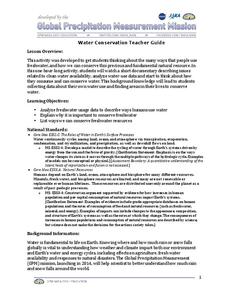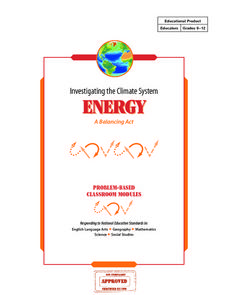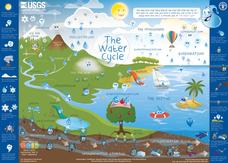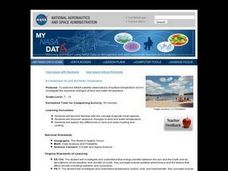Teach Engineering
Efficiency of a Water Heating System
Tired of waiting for hot water? Groups of three determine the efficiency of an electric water-heating device. They calculate the amount of energy it takes to heat the water and the theoretical amount of energy required to heat the water....
Bonneville
Bioreactor Water Circulation System
Make those microbes warm up water. Pupils first investigate water pumps, then design a water circulation system that uses solar energy. A bioreactor in the system takes energy from compost and helps heat water.
NASA
Feel the Heat
Pupils examine how solar energy can supply power and heat on the lunar surface. As groups design and build a solar-powered water heating system, they test their system to determine the change in temperature of the water and redesign it...
Curated OER
Exploring the Water Cycle
The water cycle is one of earth's most easily observable processes, but demonstrating each step within classroom walls can be a challenge. Through a series of videos and quick demonstrations, cover each aspect of the hydrologic cycle in...
Curated OER
The Hydrologic (Water) Cycle
Learners construct a model of the hydrologic cycle, and observe that water is an element of a cycle in the natural environment. They explain how the hydrologic cycle works and why it is important, and compare the hydrologic cycle to...
Baylor College
Using Heat from the Sun
Let's heat things up! This simple experiment demonstrates for students the important role the sun plays in providing the earth with energy. Place one cup of water in direct sunlight and one in shade, then take measurements in order to...
Curated OER
The Water Cycle
Your class sets up a mini water cycle model to examine the process. Then they watch an animation, following a water molecule through the cycle. A well-developed lab sheet guides learners through the lesson and a PowerPoint presentation...
Curated OER
Water Conservation
Open learners' eyes to the challenge of finding safe drinking water – something we often take for granted in our country. The PowerPoint presentation includes images, graphs, diagrams, and even a video to stimulate discussion on how we...
Curated OER
Heat Problems
In this heat worksheet, students calculate the heat energy required to raise the temperature of a liquid based on its specific heat. Students calculate specific heat. This worksheet has 7 problems to solve.
Space Awareness
Water is a Heat Sink
One of the key objectives of Europe's Copernicus Earth program is to monitor the temperatures of the oceans and seas on Earth. Young scholars learn the effects of different heat capacities through two experiments. These experiments...
Curated OER
Typical Numeric Questions for Physics I - Heat
The laws of thermodynamics raise the temperature in your classroom when physics pupils complete this worksheet! They demonstrate their understanding by calculating specific heat capacity, final temperature, amount of work done, and more....
Curated OER
Investigating the Climate System: Energy, A Balancing Act
Earth science explorers design an experiment to demonstrate that the albedo of a surface affects its temperature. They test to find out if moisture on the surface affects temperature. They discover whether or not concrete or asphalt heat...
University of Georgia
Heating and Cooling of Land Forms
Compare heating and cooling rates of different land forms. A lab activity has groups collect data on the rate of heating and cooling of soil, grass, saltwater, fresh water, and sand. An analysis of the rates shows how the different land...
Curated OER
Water Filtration
Students demonstrate the four of five procedures that municipal water plants use to purify water for drinking. A water filtration system is designed by a student and their partner. A data chart is made to record all observations when the...
US Geological Survey
Water Cycle Poster
How many parts make up the water cycle? How many things on Earth rely on water as a system? Learn more about the water cycle in an informative and colorful poster. Print and hang, or project the graphic in the classroom for optimal use.
Curated OER
The Magic of Solar Thermal: How the Sun Can Be Used to Heat Water
Learners are introduced to how the sun is used to heat water. In this solar lesson students identify the different types of solar water heating and demonstrate how it works.
Curated OER
A Comparison of Land and Water Temperature
Students examine NASA satellite observations of surface temperature and investigate the seasonal changes of land and water temperature.
Space Awareness
Oceans as a Heat Reservoir
Oceans absorb half of the carbon dioxide and 80 percent of the greenhouse gases released into the atmosphere. Scholars learn how and why the oceans store heat more effectively than land and how they help mitigate global warming. Pupils...
Science Geek
Bulk Properties of Water
Learn the ins and outs of the properties of water through an engaging slide show. The lesson presents different facts about water including phase change, heat of fusion, heat of vaporization, and specific heat among others.
Curated OER
Chemistry: Heat Energy Problems
Seven chemical systems are presented. Chemistry kids calculate the final temperature of each system using specific heat capacity of the involved substances. You will need to provide a specific heat capacity table in order for learners to...
DiscoverE
Solar-Heated Water
Heat up some interest in solar energy. Young engineers create a water heater that runs on solar power (simulated by a lamp). Using thermometers, they determine the change in temperature before and after the water goes through the heater.
American Chemical Society
The Energy Efficiency of Heating Water
Can a small change in laboratory procedures save energy? Scholars test three different methods for heating water in a science lab. Then, they calculate the energy efficiency for each and compare them to determine which uses the least...
NASA
Feel the Heat
Heat water up like a NASA engineer. Using the engineering design process, investigators create a system to trap and move heat through a water-filled tube. Designers participate in a post-activity discussion that highlights the role of...
NOAA
The Climate Team: Make a Solar Heat Engine
Learners investigate how solar energy is converted into heat in part two of the 10-part Discover Your Changing World series. They build and test homemade solar cookers to boil water and cook rice. Pupils consider the impact of heat...

























